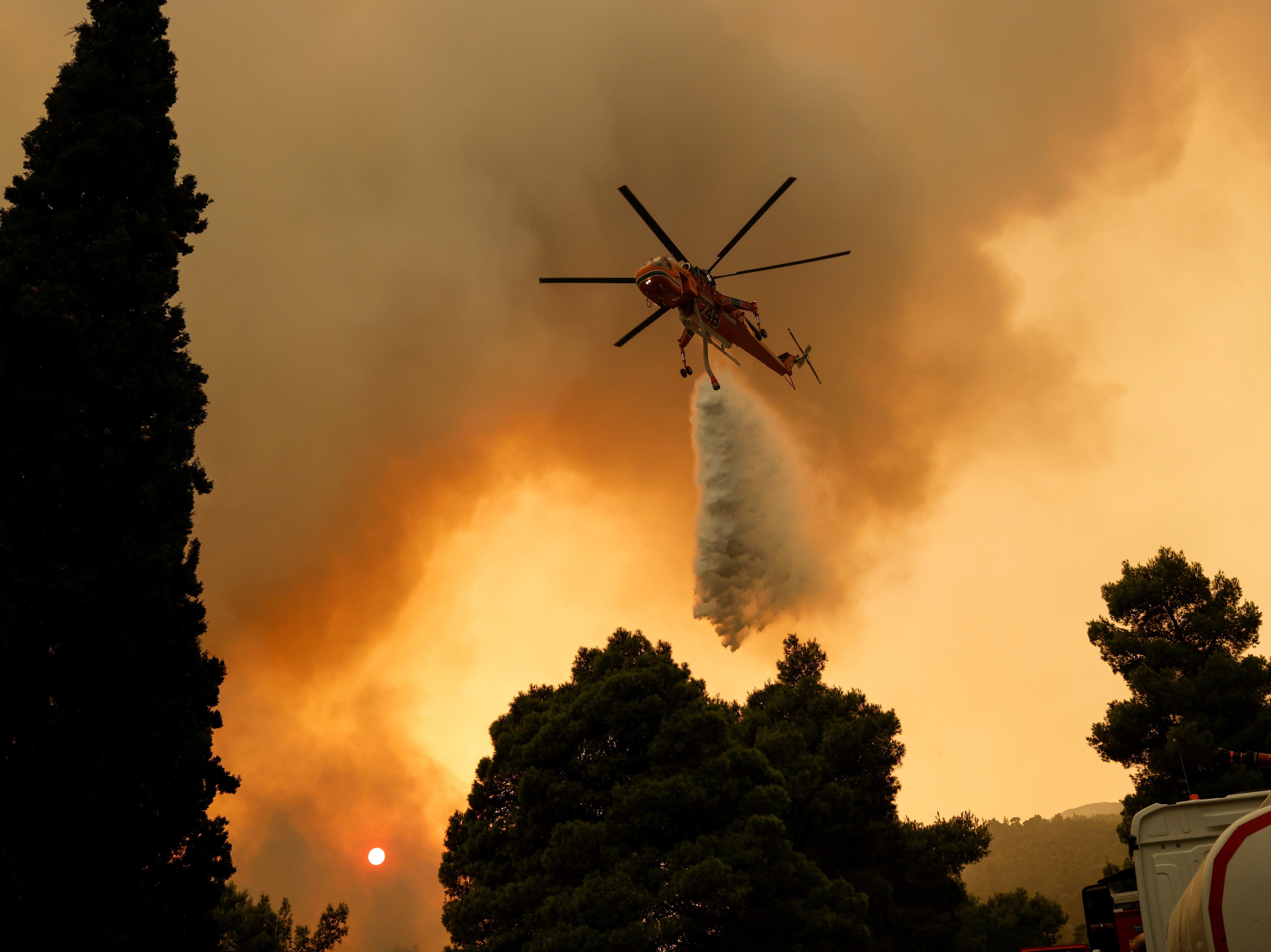‘Utterly foreseeable’ – how Greece failed to prepare for this summer’s firestorm
For the families I spoke to on Evia who rely entirely on the pine trees for their salaries, it is going to take 50 years to rebuild the forests, writes Bel Trew


You didn’t spend money on firefighting equipment, you should have sent the riot police to put out the villages.”
This was the missive scrawled on a wall in a hamlet on Evia island in Greece, an area that was ravaged by wildfires last month. Hundreds of extraordinary fires have ripped through the Mediterranean basin, which has been blasted by some of the highest temperatures ever recorded.
The graffiti sent a pertinent message to the Greek government: investment in public services needs to be shifted from policing to tackling key issues like the wildfire crisis. Across the smouldering villages, the same angry messages were repeated. Not enough had been done to prevent and then halt the fires when they first appeared, and so they were allowed to take hold, destroying tens of thousands of hectares of forest and with them, two generations of livelihoods.
Many said there had not been enough investment in fire prevention and firefighting capabilities. This was echoed in a recent op-ed written by Yanis Varoufakis, Greece’s former finance minister and the co-founder of DiEM25, the Democracy in Europe Movement.
“The climate emergency and state neglect caused this disaster,” he wrote, adding that the overall budget of Greece’s fire brigades was cut by 20 per cent in 2011. “This summer’s firestorm was utterly foreseeable – as was the inability of our state to respond effectively.”
Greek officials have argued that they faced an unprecedented situation that few could plan for. But the issue is not unique to Greece. There needs to be a radical rethink on global attitudes towards fighting wildfires, said Konstantinos Pachidis, a fire major-general manning the response to the wildfires on Evia. He told me fire departments like his across Europe badly needed more resources, more equipment and more staff “because the future is dark”.
This summer, Greece was fighting dozens of massive fires across three separate parts of the country at the same time, meaning that its fire crews were completely overstretched. Although two dozen different countries sent planes, helicopters, vehicles and hundreds of firefighters to help, Pachidis said that international cooperation needs to be improved and to go beyond joint training sessions.
He also told me that close cooperation agreements should stretch beyond the European Union to include other Mediterranean basin countries like Tunisia, Algeria and Lebanon, where wildfires have also engulfed the land over the last few months. He said there needs to be new fire prevention methods, awareness campaigns and initiatives to tackle the climate crisis and prevent the same nightmare from unfolding again.
Even the prime minister, Kyriakos Mitsotakis, has said that this year’s wildfires underlined the need for radical shifts in behaviour to tackle global warming. “Preparedness was not adequate,” he said, and dealing with the crisis “is forcing us to change everything; the way we produce agricultural products, how we move around, how we generate energy and the way we build our homes.”
While 2021 was a record year for wildfires in terms of frequency, duration and global spread (fires simultaneously burned for months in Russia and the US, as well as in Europe and North Africa), it is not going to be an exception.
Every expert I spoke to said the same thing: the coming years will be far more dangerous. “The ‘future normal’ could be far worse than what we have seen in recent years – fire risks are set to escalate with each added degree of warming in many regions of the world, including the Mediterranean,” said Matthew Jones, a research fellow at the University of East Anglia’s Tyndall Centre for Climate Change Research. He said that the average number of days where the Mediterranean faces extreme fire weather conditions had doubled since the 1980s. “As with many impacts of climate change, the less action we take now, the more we’ll struggle to deal with the consequences in future.”
And the devastation is immense. For the families I spoke to on Evia who rely entirely on the pine trees for their salaries, it is going to take 50 years to rebuild the forests. In Algeria, 90 people were killed. Areas of California are still ablaze, and homes and livelihoods were also lost.
The damage of the fires also goes well beyond the physical impact of the flames and crosses borders in the form of air pollution. The smog from Greece’s fires has already drifted across borders and is smothering neighbouring states that have so far been fire-free. In the Sakha republic in Russia, the estimated emissions from fires are double what they were last year.
Wildfires are everyone’s problem. And they are only going to get worse if nothing is done.






Join our commenting forum
Join thought-provoking conversations, follow other Independent readers and see their replies
Comments